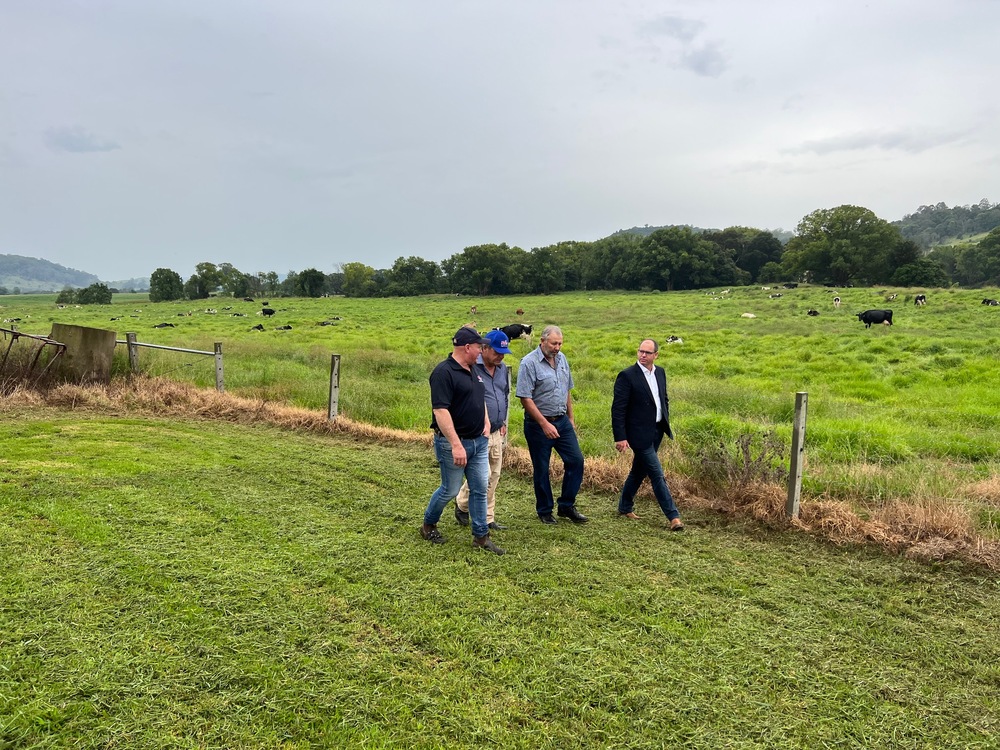Depression and anxiety rife among Northern Rivers and Aussie farmers
Simon Mumford
29 March 2023, 2:19 AM
 From left Ross Blanch, Paul Weir, Michael Hampson and Warren Elvery at Paul Weir's Tuncester farm
From left Ross Blanch, Paul Weir, Michael Hampson and Warren Elvery at Paul Weir's Tuncester farmNew research released today paints a saddening picture of the mental health of Australia's hard-working farmers with close to a third (30%) reporting a decline in their mental health over the past few years.
The National Farmer Wellbeing Report commissioned by Norco )Australia's oldest and largest 100% farmer-owned dairy co-operative) in partnership with the National Farmer's Federation spoke to over 1,300 farmers with the result that in recent years, nearly half of Australian farmers (45%) have felt depressed, with almost two thirds (64%) experiencing anxiety. For one in seven (14%) it's a frequent experience.
Even more devastating, close to half of Australian farmers (45%) have had thoughts of self-harm or suicide, while close to a third (30%) have attempted self-harm or suicide.
According to the report, the top three factors impacting farmers mental health are weather or natural disasters (47%), financial stress (36%) and inflation and cost pressures (35%).
Norco CEO Michael Hampson highlighted the fact that Northern Rivers farmers have had a tough time from natural disasters for the majority of the last six years through the 2017 flood, droughts in 2019 and the devastating floods of 2022 in February and March. This is on top of a period of increasing costs such as fuel and fertiliser adding another element of concern in the day-to-day life of a farmer in the Northern Rivers plus the isolating two and half years of COVID-19.
Ross Blanch is a dairy farmer and a crisis counsellor who has had 30 years of experience working with Lifeline. Three years ago Ross and Lifeline started a farmer-to-farmer program, he now looks after 100-150 farmers.
"I've been able to support them (farmers) through crises like droughts, floods but I just feel it is not enough of me to go around all the farmers. The ones that I have been able to help have seen their lives changed so much for the better. But there's not enough of us doing the work."
"What you'll find is that farmers will struggle on. Physically they can keep going for a certain amount of time and then once they're affected mentally you see the farm starting to struggle and then that's a spiral down that can cause thoughts of self-harm and the after-effects of mental health."

Local dairy farmer Paul Weir who lost over $3 million in damages alone from last year's floods gave an insight into how mental health problems affect the day-to-day operation of a farmer.
"Some closer friends that I know have really struggled. It was a struggle getting out of bed, it was a struggle to actually get up and face the commitments for the day or they would just prefer to go away and sit quietly at the back of the shed so to speak, and just let everyone else get on with the job. They just couldn't confront it."
"Without a network of people to actually just sit down and have a chat with them and talk it through that's when the dangers of some of those really confronting figures come to the forefront."
"We need to be aware and help farmers get out of it but also we actually need to talk about the importance of farming and the impacts they have on consumers more often."
Michael Hampson told reporters his father drummed into him that we live off the backs of our farmers.
"When our farmers do well, our communities do well and we all do well. There was a sense of pride about helping our farmers and making sure that they feel valued across the entire country for what they do and we need to get to that."
Part of the report said that 76% of our farmers don't think that we, as a community, value the work they do.
Mr Hampson said one solution to lower that statistic is to buy Aussie farmer produce.
"Aussie farmers are the ones that are providing jobs to regional communities. They're providing a hell of a lot of economic value to our country. Yes, it's going to cost a little bit more but it's going to be a much better product. It always is."
"Let's make sure we show our farmers that we value them and buy their product and walk past the cheap foreign-owned and imported products so that we can send a clear message to our farmers that we value what they do."
Another suggestion mentioned was to say g'day to a farmer when you see them on the street and say you appreciate the job they're doing for the community.

